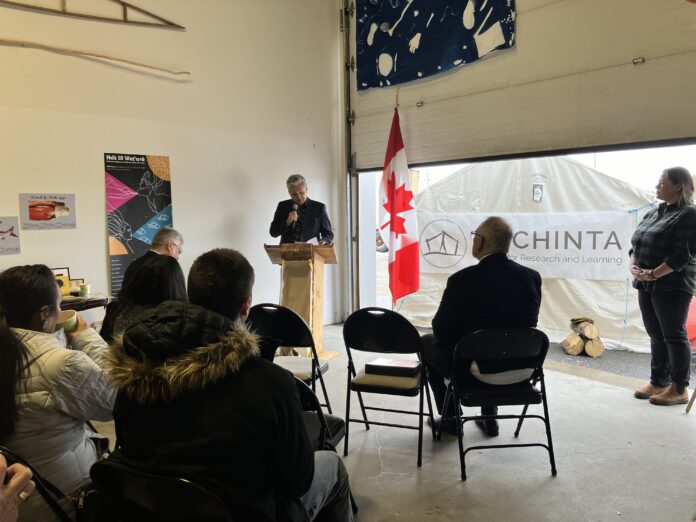The federal government has announced a $5.2 million investment toward the Dechinta Centre for Research and Learning to support post-secondary education for First Nations students.
The announcement was made at the Dechinta Centre on April 25th by The Hon. Vandal, Minister of Northern Affairs, The Hon. Blair, Minister of National Defence, and Michael McLeod, Member of Parliament of the Northwest Territories.
The Dechinta Centre for Research and Learning offers seasonal land-based learning programs, known as camps, during the spring, summer, fall, and winter. The program is designed for a small group of students who receive credits from the University of British Columbia (UBC). The program’s grade is divided equally into two parts: 50 per cent for land-based skills, such as hide tanning, muskrat trapping, fishnet checking and setting, sewing, and beading, and the remaining 50 per cent for academic studies. Professors from British Columbia, Ontario, and Yukon teach the academic portion of the program for credit. The students are taught about self-governance, self-determination, and Indigenous resurgence for the academic portion. The course is conducted in the wild, in a tent, and includes participation from elders, professors, and students.
Kelsey Wrightson, who serves as the executive director of the Dechinta Centre for Research and Learning, felt excitement and a sense of responsibility when she heard the announcement. Wrightson says the work they do has a positive impact, and many communities have expressed their readiness for new programming, partnerships, and collaborations.
The centre is creating a new approach to community-led education, which includes all community members ranging from infants to 90-year-olds. The stories people tell themselves about their capability of pursuing education directly impact their educational pursuits, says Wrightson. When individuals do not see people in their community or family members pursuing education, they are less likely to pursue it themselves. However, this can be changed. Over the past five years, more than 180 students have participated in this post-secondary education program.
Kyla LeSage is the outreach coordinator for the Dechinta Centre for Research and Learning. She participated in the program through UBC in 2018 and graduated from the University of Calgary with a degree using those credits.
“It connected me back with the land and Yellowknife,” says LeSage. “I was able to come back home and learn from my elders.”
She also mentioned that the program is inclusive of families. One of the most significant barriers to delivering university courses is that people cannot find childcare and have to leave. When students are invited to attend, they can bring their children who can participate in the children and youth program. So, they are learning alongside their parents.




